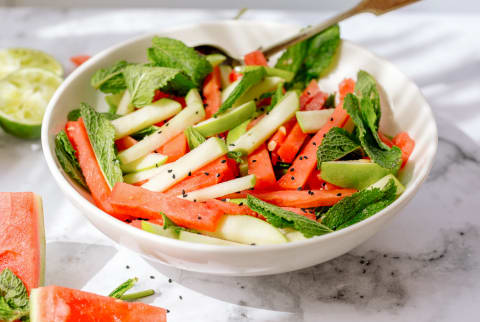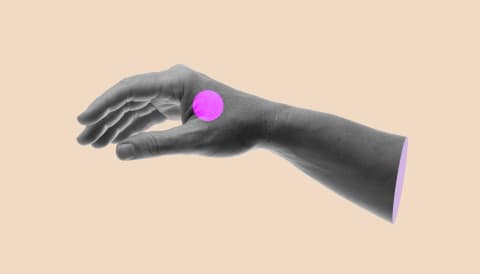Advertisement
Traditional Chinese Medicine Techniques For Staying Cool All Summer


In traditional Chinese medicine (TCM) five-element theory, summer is ruled by the fire element. The season's long days are all about vitality, passion, expansion, joy, and movement. The sun is shining, trees are lush, and people tend to be more energized. It's a very yang time of year, defined by masculine and active energy.
Not everyone enjoys the summer season and the heat it brings. According to TCM, one's reaction to it largely depends on their body's constitution: People with more yang energy tend to have a harder time during the hot months and can easily become overheated and irritable. On the other hand, people with more yin energy tend to endure the heat better.
No matter what your constitution, if you're not careful, excess fire energy can consume your body and lead to overheating, breakouts, irritability, digestive issues, heartburn, and insomnia. Living in rhythm with the season is the key to keeping the body and mind steady. Here are some TCM tips to help you keep cool and balanced this summer:
Lighten up your diet, and drink more water.
Many people naturally have a smaller appetite in the summer1, when the body requires less energy for thermoregulation2. This is the season to eat smaller meals with lighter ingredients. While there's nothing wrong with overindulging every now and then, try to be mindful of how you navigate those outdoor barbecues and birthday picnics. Stay away from heavy, greasy, fried foods in general, and try to avoid beer and sweets when you can. Such foods tax our digestive system and can create a combination of excess heat and "dampness" in the body. Instead, opt for simple meals made from fresh ingredients. (Here are some ideas to get you started.)
Remember that sometimes thirst can mislead you into thinking you are hungry because dehydration can be masked as craving. So make sure to frequently hydrate throughout the day during the summer months.
Cool down with food.
The extreme heat makes it tempting to reach for icy refreshments such as slushies and ice cream. Contrary to popular belief, these icy treats don't really help the body cool down according to TCM. It may feel satisfying in the moment, but eating something ice-cold actually requires more energy from the body since it needs to be heated up to body temperature before digestion and assimilation can take place. This can slow down digestion and metabolism, leading to symptoms such as bloating, heaviness of the head, stomach pain, or even diarrhea.
Instead of choosing foods with low temperature, go for ones that have a cooling effect on the body. Some examples include watermelon, mint, mung bean soup, cucumbers, green tea, celery, strawberry, yogurt, and barley. Similarly, bitter taste is related to the fire element. So choosing food with bitter taste can also have a cooling effect on the body. But remember, everything in moderation.
Give yourself an acupressure session.
Acupressure—the technique of applying pressure to key points along the body—is another way to effectively cool down. Below are some points that can dispel heat from the body and ease irritability. Hold down the point for four breaths, then release for one breath, and repeat for one to two minutes at a time daily or whenever you feel overheated. You can use your hands, but I like to use an acupressure tool for more precision and less aggravation on the skin afterward.
Large Intestine 11:
This point is at the end of your outer elbow crease as you flex your forearm. It's thought to cool heat sensation and help manage inflammatory reactions in the body.
Large Intestine 4:

Stretch out your hand facedown. There should be a "V" that forms between the web of the thumb and index finger. This point is approximately in the center of the web; palpate for the most tender spot. Besides helping to support immunity, this point can also cool the body, regulate sweat pores, and relieve headaches.
Heart 8:
With palm facing up, curl your fingers into a loose fist. The point is where your pinkie finger lands, on the palm between the fourth and fifth metacarpal bones, is Heart 8. This point is thought to calm fiery symptoms such as agitation, insomnia, skin rash, and itchiness.
Be mindful of temperature yo-yoing.
After spending hours sweating in the summer sun, the instinct is to rush indoors and stand in front of the air conditioning for 15 minutes. But this sudden and drastic change in temperature can put stress on the body by forcing it to thermal regulate quickly; switching from vasodilation to vasoconstriction. The sudden change in temperature can dry out mucous membranes and that’s why sometimes we sneeze3 and get itchy eyes when we walk into a freezing room. Exposing the body to acute, cold temperatures can depress immune responses4, stimulate stress-hormone production, lead to circulatory and metabolic changes. This is why in Chinese medicine traditions, we strongly advise against having a cold, windy draft blowing directly at the body. “Wind-cold” is one of the major 6 TCM pathogenic factors that increases stress hormones after exposure and results in the suppression of nonspecific cellular immunity.5 Your body needs time to acclimate to temperature change. Allow it time to cool down naturally by going into the shade, or indoors, and with the help of a cooling drink.
These simple TCM tips have exponential benefits for living your summer to the fullest while maintaining your well-being.

















